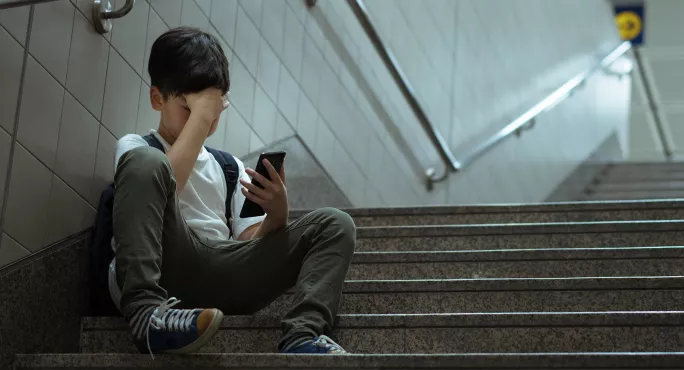Faster school mental health team rollout urged amid ‘crisis’

A faster expansion of mental health support teams is needed, a headteachers’ union has warned, after the children’s commissioner said new data revealed a “crisis” in children’s mental health treatment.
The NAHT school leaders’ union said that the rollout of mental health support teams needs to be “speeded up” after Dame Rachel de Souza’s report showed demand for children’s mental health services “continues to outstrip the availability of support”.
The report, which analysed NHS England data for the financial year 2022-23, found that nearly one million children and young people (949,200) were referred to Children and Young People’s Mental Health Services (CYPMHS), equal to 8 per cent of the 11.9 million children in England.
Almost 305,000 entered treatment, but well over a quarter of a million (270,300) were still waiting at the end of the year, and 372,800 (39 per cent) had their referrals closed before accessing CYPMHS.
Boys, younger children and white pupils all wait longer for mental health support on average, the report found.
Meanwhile, the data showed that about 32,200 children waited for more than two years for their second contact from mental health services.
James Bowen, assistant general secretary of school leaders’ union the NAHT, said that “these shocking figures lay bare the government’s failure to ensure children get timely support in the community, and while school staff work tirelessly to support their pupils, they do not have the expertise or resources to provide all the help young people need”.
- Policy: Most primary schools won’t have mental health support teams
- Covid inquiry: ‘Major mistake’ to keep schools closed
- Children’s mental health: How much can schools do?
Mr Bowen called for the government to invest far more in children’s mental health services and social care, including “speeding up the rollout of mental health support teams in schools”.
The fresh data, published today, comes after it was revealed that pupils at nearly three-quarters of primary schools will not have access to mental health support teams by the end of this year, according to Freedom of Information requests by the Liberal Democrats.
Dame Rachel said that this generation of children has experienced “uniquely uncertain and challenging times”, including the coronavirus pandemic and the cost-of-living crisis. An increasing number are also “exposed to the harmful impact of social media, cyberbullying and online exploitation”.
“I do not think it is an overstatement to speak of a crisis in children’s mental health and the services needed to support them,” she said.
“For children who need it, support should be put in place quickly and locally: no child should be left on a waiting list for months or years.”
‘Cocktail of problems’ behind rise in demand
Geoff Barton, general secretary of the Association of School and College Leaders, said the number of young people requiring mental health support appears to be attributable to a “cocktail of problems”.
Factors contributing to the need for mental health support include “very high levels of child poverty”, “toxic content on social media platforms”, “the sheer weight of high-stakes exams that have resulted from government reforms”, and “a SEND system which is underfunded and under pressure”, Mr Barton continued.
“We have to get better both at providing access to specialist services needed by children and young people who are suffering from mental health problems and dealing with the root causes of those mental health problems,” he said.
Early support would cut need for NHS treatment
Dame Rachel said “fresh, long-term thinking” is needed for children’s mental and emotional health and wellbeing as “this generation of children have faced uncertain and challenging times like no other generation before them”.
“Children need environments - both online and offline - where they grow up feeling happy, safe and supported, and aren’t left to feel like second-class citizens when it comes to accessing mental health support,” she said.
She added that many children would not need access to mental health services if they received “the right early support”.
An NHS England spokesperson said: “Latest figures show the NHS is treating more young people than ever before, with 48 per cent more children and young people accessing support since 2019-20, and the health service is expanding this provision as quickly as possible within the current five-year funding arrangements to meet this rising demand.
“But we know there is more to do, which is why plans are also in place to ensure more than one in two pupils in schools and colleges have access to an NHS mental health support team by spring 2025 - significantly ahead of the original target.”
For the latest education news and analysis delivered directly to your inbox every weekday morning, sign up to the Tes Daily newsletter
You need a Tes subscription to read this article
Subscribe now to read this article and get other subscriber-only content:
- Unlimited access to all Tes magazine content
- Exclusive subscriber-only stories
- Award-winning email newsletters
Already a subscriber? Log in
You need a subscription to read this article
Subscribe now to read this article and get other subscriber-only content, including:
- Unlimited access to all Tes magazine content
- Exclusive subscriber-only stories
- Award-winning email newsletters



